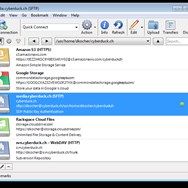Cyberduck vs gFTP
Compare features, pricing, and capabilities to find which solution is best for your needs.

Cyberduck
Cyberduck is a free, open-source client for file transfer, supporting FTP, SFTP, WebDAV, and major cloud storage services. It provides a user-friendly interface for managing files on servers and in the cloud. by iterate GmbH

gFTP
gFTP is a discontinued, free, open-source, multithreaded File Transfer Protocol client with a focus on simplicity and performance, offering support for various file transfer protocols like FTP and SFTP, primarily for Linux and Unix-like systems.
Comparison Summary
Cyberduck and gFTP are both powerful solutions in their space. Cyberduck offers cyberduck is a free, open-source client for file transfer, supporting ftp, sftp, webdav, and major cloud storage services. it provides a user-friendly interface for managing files on servers and in the cloud., while gFTP provides gftp is a discontinued, free, open-source, multithreaded file transfer protocol client with a focus on simplicity and performance, offering support for various file transfer protocols like ftp and sftp, primarily for linux and unix-like systems.. Compare their features and pricing to find the best match for your needs.
Pros & Cons Comparison

Cyberduck
Analysis & Comparison
Advantages
Limitations

gFTP
Analysis & Comparison














